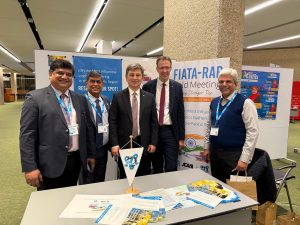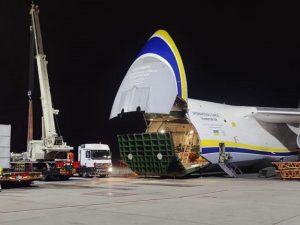Kamal Jain, Director, Cargomen Logistics said, “Congestion at airports during peak hours severely impacts cargo efficiency, resulting in delays, extended transit times, and elevated logistics costs. The root causes often include inadequate infrastructure, suboptimal cargo handling, and poor stakeholder coordination. The solution lies in two key areas: implementation of robust Standard Operating Procedures (SOPs) and automation of cargo handling. SOPs must clearly define vehicle entry, parking, cargo acceptance, evacuation, and terminal exit. Integration of automated systems for documentation and process flow will ensure faster turnaround and improved operational efficiency. Terminal must work on continuous monitoring of turn around time of IN / OUT of vehicle and also work on predictive analysis to deploy manpower and resources.”
Read More »‘Aware exporters about benefits of releasing cargo during non-peak hours to ease congestion’
Debajyoti Bagchi, Vice President, Business Development, TT Group said, “All air cargo stakeholders expect their shipments to be offloaded at the air cargo complex immediately upon truck arrival. However, most airlines operate during premium slots allocated at peak hours, creating a sense of urgency on the shop floor. This results in a rush for offloading, panic if cargo misses connections, delays in screening and buildup, resource shortages, potential cargo damage, and onboard no-fit situations. A small process change can make a significant impact if effectively implemented and accepted by exporters. Currently, non-peak hours remain underutilized. Custodians can introduce attractive concessions to encourage stakeholders to shift operations to off-peak times, optimizing existing manpower. Raising awareness among exporters about the benefits of releasing cargo earlier can further ease congestion. Concerns regarding free period adjustments can be addressed through negotiations with custodians to ensure fair compensation. While this approach may not provide an immediate solution, it presents a viable strategy to alleviate bottlenecks at cargo terminals.”
Read More »‘Absence of regulated parking & offloading processes result in huge cargo bunching’
Sunil Kohli, Managing Director, Rahat Cargo said, “The congestion mainly at the airports especially located in the metro cities begins from the approaching roads leading to the cargo warehouses with plenty of vehicles carrying the cargo lined up for the entry during the peak hours. The congestion subsequently shifts to the cargo offloading point at the limited truck-doc areas due to departure schedules of flights of several carriers coinciding with each other followed by a delayed process of weighment by the custodian. An absence of regulated parking & offloading processes at the platforms results in bunching of huge cargo waiting for their turns. Congestion further occurs for the screening process wherein large volumes of cargo queues up thereby incurring considerable delays, inflated waiting time & an avoidable wastage of manpower. Thus, all the related agencies have to provide the requisite facilities commensurate with the growth of cargo tonnage facilitating hassle free timely handling of processes. The related agencies must install additional provisions and redesign their systems and processes, wherever needed to be in readiness for any peak demand scenario. They must also consider using technology, coordination, and best practices to optimize the use of resources and minimize delays and congestions.”
Read More »ACAAI members meet & greet FIATA President in Geneva
C K Govil, President and Samir J Shah, Vice President at The Air Cargo Agents Association of India (ACAAI) and Amit Kamat chairman – elect, FFFAI welcomed Turgut Erkeskin President FIATA, and Stephane Graber Director General FIATA during the ongoing FIATA Head Office meeting in Geneva. The ACAAI President along with VP and Past President are promoting the FIATA RAP event to be held in Delhi from 21st May to 24th May 2025. The ACAAI members are actively participating in the event.
Read More »Eicher Trucks supplies electric Eicher Pro X small trucks to Magenta Mobility
Eicher Trucks started the of supplies of the Eicher Pro X small truck to Magenta Mobility. As per, phased plan for initial order of 100 units, the first batch of Eicher Pro X small trucks featuring 1.7T payload will be deployed across Magenta Mobility’s operations in major markets, including Mumbai, Delhi NCR, Bangalore, Hyderabad, and Chennai. These vehicles will play a key role in reinforcing Eicher Trucks and Magenta Mobility’s vision of driving sustainable logistics and strengthen Magenta Mobility’s mission of decarbonising India’s supply chain. S S Gill, Chief Commercial Officer VE Commercial Vehicles, said, “Through this association with Magenta Mobility, we are driving the future of smart logistics with advanced, eco-friendly transportation solutions The Eicher Pro X range is designed to meet the growing demand for high performance, energy-efficient vehicles in the mid-mile and last-mile delivery sectors and aligns with Magenta Mobility’s focus on decarbonizing last mile mobility.”
Read More »‘Air freight SEZs near airports essential to boost trade’
The setting up of freight-specific Special Economic Zones (SEZs) near airports are essential to boost exports, says Jayesh Tanna, CEO, ECU Worldwide, adding that it can foster an environment for cargo-centric airline expansions and for simplifying customs procedures with faster clearances and digital documentation. He also adds, “One of the main hurdles to the fast growth of India’s air cargo industry is the lack of smooth integration between freighters and passenger services. Another major issue is that most airports have poor connection with other forms of transportation. Despite the fact that India has over 70 airports with cargo capabilities, many of them are still underutilised because there is a lack of multimodal integration, which is essential for effective last-mile delivery. Moreover, absence of dedicated warehouses at most Indian airports for perishable goods and pharmaceutical products, coupled with regulatory bottlenecks in their export, remains a significant barrier to the rapid growth of the country’s air cargo sector.”
Read More »Antonov Airlines, Air Partner unite to ferry time-critical shipment
To enable global oil industry operations, stay uninterrupted, Antonov Airlines and Air Partner have transported time-critical shipment – a valve for an oil refinery from Roma Fiumicino Airport (FCO) to the Middle East following an urgent request. Weighing over 20 tonnes and measuring over three metres in height, transporting the oversized equipment required specialist planning. Antonov Airlines’ AN-124-100 was used to carry the item. An external cargo ramp, manufactured by Antonov in-house engineers, and crane for loading were also required due to the size of the valve. Additionally, the valve had to be accommodated via an extra metal frame and super strong shackles for lashing. Due to the time-sensitive nature of the shipment, Air Partner and Antonov were required to work intensively, alongside Gruber Logistics Italy and Alha Group, to ensure it was delivered on time to the client.
Read More »Challenge Group joins industry body to enhance global ops
Challenge Group has announced its new affiliate membership with the International Federation of Freight Forwarders Associations, FIATA. The Group’s admittance into FIATA will enable it to be part of larger industry discussions surrounding evolving regulations, capacity constraints, and supply chain disruption issues that have been of increasing concern as of late. As an international freight operator, its collaboration with other members in the network is a strategic move and a natural next step for the Group. Chief commercial officer of Challenge Group, Or Zak, said of the new membership. “By providing reliable, integrated, and bespoke logistics solutions, we enable global trade efficiently and effectively. As an affiliate member of FIATA, we are excited to contribute our expertise and insights from a freighter operator and handling agent perspective. We believe this collaboration will create stronger synergies between different supply chain stakeholders, ultimately benefiting the entire industry.”
Read More »ACAAI participates in FIATA meet to discuss air cargo issues
The Air Cargo Agents Association of India (ACAAI) is participating at the FIATA HQ Meeting 2025 in Geneva, Switzerland being held from March 17-20, bringing together key leaders from the global freight forwarding and logistics industry, to discuss key industry issues and developments. ACAAI President C.K. Govil is actively promoting FIATA RAP 2025, joined by esteemed industry representatives namely, Dao Trong Khoa Paul – President, VLA, Samir Shah – Vice President, ACAAI, Keshav Tanna – Past President, ACAAI, Amit Kamat – Chairman Elect, FFFAI, Yukki Nugrahawan Hanafi – Indonesian Logistics Federation Association and Tej Contractor, FFFAI.
Read More »Cargojet flies to Mumbai 1st time, expands global network
Canadian freighter operators, Cargojet has carried out its first charter flight to Mumbai. “We marked our inaugural air cargo charter flight to Mumbai (BOM) Airport, strengthening our global network and expanding our reach into South Asia. This mission was a testament to our commitment to delivering seamless, reliable, and time-sensitive solutions to customers worldwide. From specialised handling to efficient cargo movement, we are leading new standards in global logistics,” said official LinkedIn Post.
Read More » Cargo Breaking News
Cargo Breaking News









